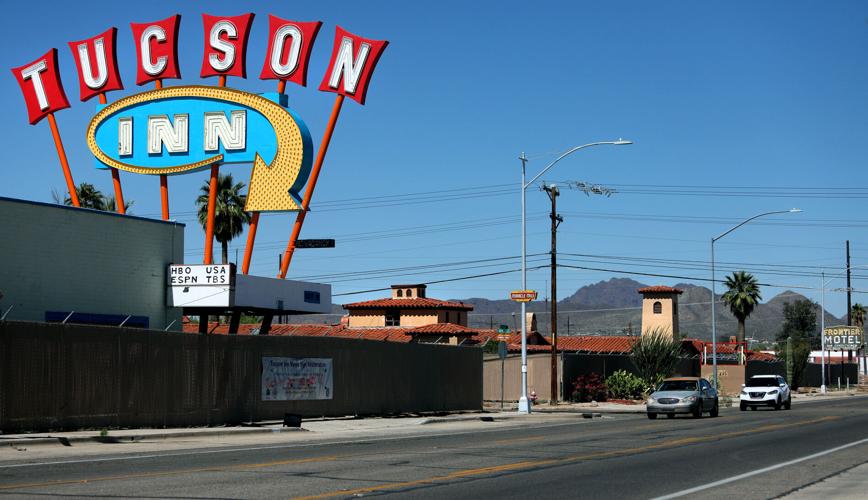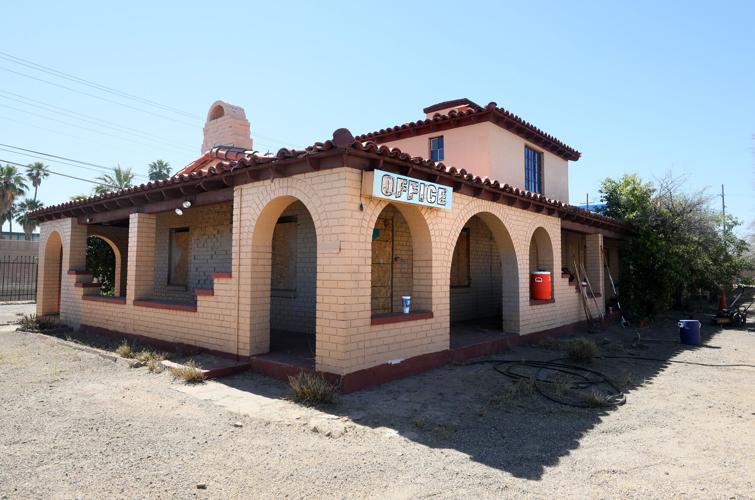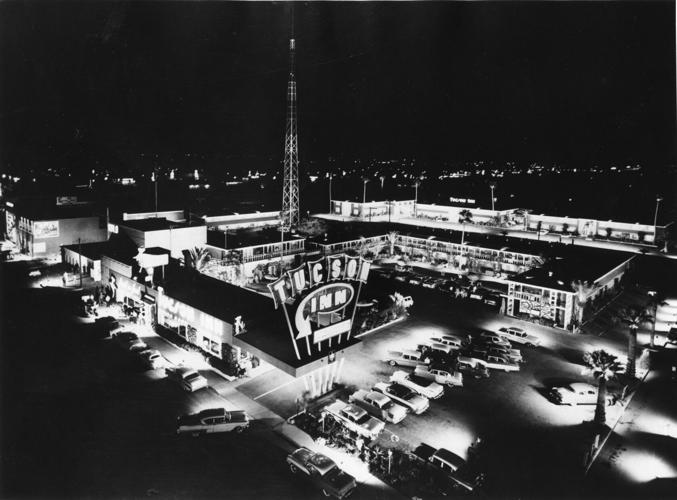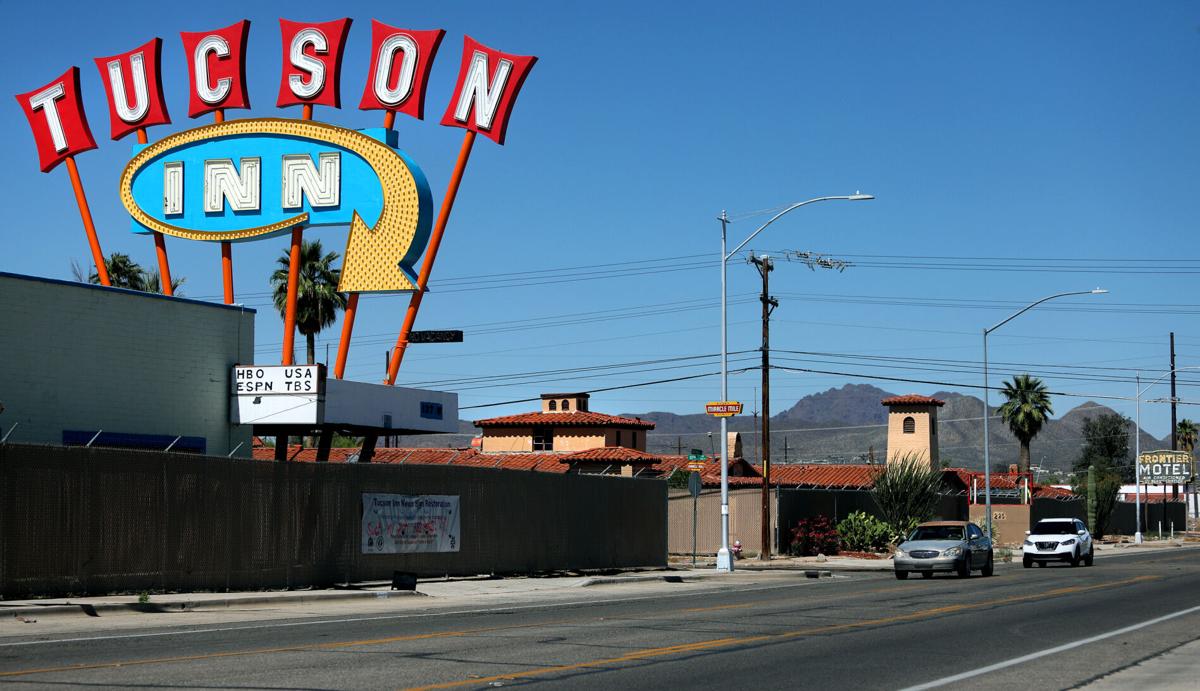Pima Community College’s Governing Board is weighing the fate of three historic hotel properties on Drachman Street north of downtown Tucson.
At a board study session Monday, dozens of community members came out in support of preserving the structures and using the spaces to support the college’s operations instead of tearing them down.
“You’re inheriting a moral duty to do the right thing,” Carlos Lozano, who served eight years on the Tucson-Pima County Historical Commission, told the board. “The Drachman hotels can be used productively.” He added that in his view, “Local governments and public institutions that serve the community are held to a higher standard than the average developer.”
But some aren’t so sure PCC should be putting its money toward historic preservation projects, especially because the college originally set aside $10 million for the project, but new estimates show a tentative plan the board advanced two years ago would now cost $35.7 million.
Board member Maria D. Garcia said at a study session in April that she’s “fully supportive of cultural history,” but that given the college’s declining enrollment, renovating these properties “should not be a priority for PCC.” She added that “If the city wants them, let the city do something with them.”

The Copper Cactus Inn (1942) at 225 W Drachman St, is one of three historic motels purchased by Pima Community College between 2017-2018. The historic motels, which also include the Tucson Inn (1952) and the Frontier Motel (1941) are near PCC’s downtown campus. The college’s governing board will soon decide, after gathering public input, to either demolish them entirely or adaptively reuse and restore the buildings.
The college purchased the hotels — the Tucson Inn (1952), Frontier Motel (1941) and Copper Cactus (1942) — several years ago. They’ve sat vacant since, sustaining damage from weather and vandalism. All of the buildings would need considerable physical repairs and modifications before they could serve the college’s needs.
After it gathers more public comment, the board will eventually pick one of the following options:
For $35.7 million: Keeping the original plan the board advanced in 2021, which included restoring the Frontier Motel and Copper Cactus and the diner at the Tucson Inn and creating a 26,750-square-foot space over a portion of the Tucson Inn that would be demolished.
For $8.9 million: Demolishing the Copper Cactus, Frontier Motel and the back half of the Tucson Inn, but repurposing the inn’s front half which includes the diner. The plan also calls for preserving the hotel signs. The plan would create a 4,500-square-foot space in addition to a 190,000-square-foot parking lot.
For $17.3 million: Repurposing the front of the Tucson Inn, demolishing the Copper Cactus, maintaining all signage and building a new 6,000-square-foot building. This would create 10,500 square feet of space and 137,500 square feet for parking.
For $3.6 million: Demolishing all three hotels, but maintaining signage. This would create a 220,000 square-foot parking lot.
Part of historic district
All three hotels are contributing properties to Tucson’s Miracle Mile Historic District, which is listed on the National Register of Historic Places. Former PCC board member Demion Clinco, who lost his bid for re-election last fall, wrote the nomination for the district in 2017.
The district is considered historically significant because in the mid-20th century it served as a commercial corridor for travelers touring the nation, and represents the rise of auto culture in the United States.

Photographers Ben Maxey and Stan Davis draped the Tucson Inn with more than three miles of wiring and 600 flash bulbs to create this amazing night image in 1957. The photographer was 78-feet aloft in a concrete bucket dangling from a crane.
According to the Tucson Historic Preservation Foundation, the Tucson Inn, which architect Anne Rysdale designed in 1952, is considered one of the finest examples of roadside architecture in the city and the state, alongside Tucson’s Ghost Ranch Lodge on Miracle Mile and Flamingo Hotel on Stone Avenue.
While the Tucson Inn’s fate remains unknown, PCC recently completed restoration of the hotel’s iconic neon sign.
How PCC may use properties
The upcoming vote has been more than five years in the making.
In September 2017, the board approved purchase of the Tucson Inn at 127 W. Drachman St. for roughly $1.1 million. It subsequently approved buying the nearby Frontier Motel for $1.3 million and the Copper Cactus for $1.6 million in June and November of 2018, respectively.
According to PCC’s 2018 facilities master plan and other board documents, the board approved the purchase of the hotels with an intent to expand the college’s downtown footprint “to allow for program growth, program relocation and potential new centers.”
The college has proposed multiple possible uses for the spaces, which could include:
Using the diner at the Tucson Inn for the PCC culinary and hospitality program.
A diversity, equity and inclusion center.
A teaching and learning center.
An innovation center.
An education technology lab.
At a June 2021 board study session, PCC Chancellor Lee Lambert — who on Tuesday announced his imminent departure for a new job helming a California community college — and his staff presented multiple options for the “planning, design and construction for the adaptive repurposing and development of the Downtown Campus Hotel/Motel properties.”
Those options included a significant range in estimated cost and scope — from $3.7 million to demolish all of the properties and build a parking lot in their place, to $83 million to repurpose the hotels and build an additional building.
But one option emerged as the leading choice for the board.
It involved restoring the Frontier Motel and Copper Cactus and the diner at the Tucson Inn. This plan additionally called for building a parking lot over a portion of the Tucson Inn that would be demolished.
Two days after the five-member board heard these project options, it approved a motion to move forward with pursuing that plan, with a modification to conduct a feasibility study “related to the south-end building of the Tucson Inn for either parking and/or hotel use.”
At that time, that option with those modifications was estimated to cost around $13.6 million.
But the motion the board passed in June 2021 did not authorize spending any money, it only authorized consideration of the project and a feasibility study. However, in anticipation of the project moving forward, college administrators earmarked $10 million to have on hand for when the renovation project got underway.
Project never had full support
And while the board approved the motion to move forward in June 2021, it did so with support from only three of its members, and none of those supporters, who included Clinco, are still on the board.
Garcia and board member Luis L. Gonzales, who have publicly criticized Lambert for years, abstained from voting on the 2021 motion. They are now the only two current board members who were present when the initial discussion of the project started.
In an interview Thursday with the Arizona Daily Star, Lambert said the college’s attention to the hotel properties met a pause shortly after the 2021 motion passed.
A block party was held Dec. 12 to celebrate the lighting of the Tucson Inn sign near Pima Community College's downtown campus. The sign's restoration started as part of the Tucson Historic Preservation Foundation's Neon Sign Project.
Wednesday's event, hosted by the PCC Governing Board, featured a preview of the lit sign, which is set to be full operational in early 2023. Video by Pascal Albright / Arizona Daily Star.
That’s because around that time, the college was also dealing with complaints — which Garcia and Gonzales openly endorsed — about Lambert’s leadership an ex-employee made to PCC’s accreditor, the Higher Learning Commission. It took more than a year for the commission to investigate and resolve those complaints, but last fall it issued its final report, which dismissed the majority of the accusations.
“We only have so much bandwidth as an institution,” Lambert said. “We had to focus our energies in certain areas. This (hotels project) did not require us to make an immediate decision. The HLC issues required a greater level of attention, and then we also had an election coming up.”
But by this spring, other costly maintenance issues — including a failing HVAC system at PCC’s 29th Coalition Center — had arisen, which, according to Lambert, prompted the college to revisit its plans for the hotel properties within the context of its broader discussions about budgeting for facilities maintenance.
Cost estimates detailed
At an April 24 board study session, where a range of maintenance issues were discussed, facilities management staff told the board that a recent feasibility study showed the plan for the hotels the board approved in 2021 would cost about $35.7 million — roughly $26 million more than the $10 million the college had originally allocated for the project.
While members of the historic preservation community have questioned those major cost discrepancies, Brandye D’Lena, assistant vice chancellor for facilities, explained that it’s not a direct comparison.
The $10 million figure “was never intended to represent a project budget,” D’Lena told the board on Monday. “Rather, it was an amount set aside so we could go through this process and get into construction, and at that point understand truly what the budget would be.”
According to a presentation by GLHN Architects and Engineers, Inc., the local firm that did a feasibility study for the project, the $35.7 million estimate can be traced to a drastic rise in construction costs over the past three years.
According to the firm’s research, new construction costs of specialized spaces (the hotel properties have potential to fall into that category) could run upwards of $1,000 per square foot. Additionally, the report also notes that heavy renovation costs in the Phoenix area (the closest geographic area with this available data) have risen from $350 per square foot prior to 2020 to $625 this year.
At the April board meeting, Lambert said that because the board had already “made a commitment to adaptively reuse those properties,” it should weigh that before it makes a final decision.
“If you change the commitment,” he said, “we need to be able to explain very clearly the reasons why (you made) the change.”
Photos: Newly restored Tucson Inn sign lights up for the first time

Chuck Penson gets a cell phone photo of the newly refurbished neon sign for the Tucson Inn shortly after it was lit for the first time, Tucson, Ariz., December 14, 2022. This lighting is temporary as the sign is expected to be fully operational early next year. The iconic neon sign was refurbished through the partnership of the city's Thrive in the '05, Pima Community College and Ignite Sign Art Museum and has around 800 feet of neon, 22 transformers and nearly 800 bulbs.

A pedestrian stroll past the newly refurbished Tucson Inn neon sign shortly before a ceremony to throw the switch and light the iconic landmark again, Tucson, Ariz., December 14, 2022. A small crowd turned out for the block party to celebrate the sign's return.

The newly refurbished neon sign for the Tucson Inn seen through the lights of a decorative Christmas tree shortly after the neon sign was lit, Tucson, Ariz., December 14, 2022.

The evening sun set behind the newly refurbished neon sign for the Tucson Inn, Tucson, Ariz., December 14, 2022.

Juan Moreno sings with Pina Community College's Mariachi Aztecas, the evening's entertainment before the lighting of the newly refurbished neon sign for the Tucson Inn, Tucson, Ariz., December 14, 2022.

The neon sign for the Tucson Inn, lit for the first time since it was repaired, Tucson, Ariz., December 14, 2022. The main work on the sign was completed late last month.

A few people stop to get photos the newly refurbished neon sign for the Tucson Inn, glowing along Drachman Street, Tucson, Ariz., December 14, 2022.






